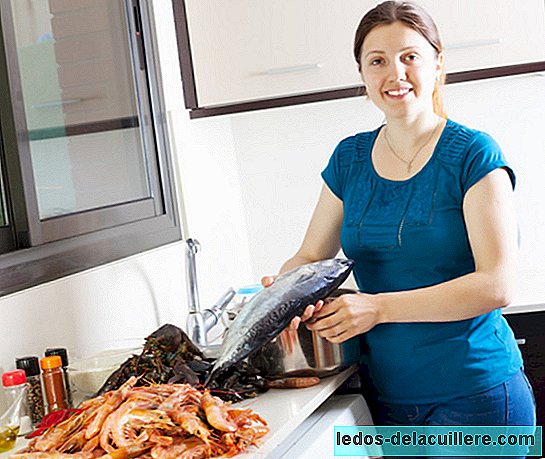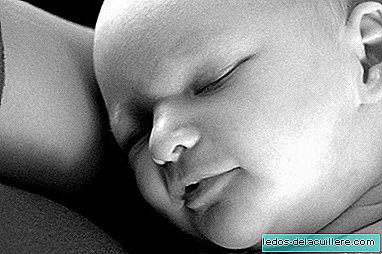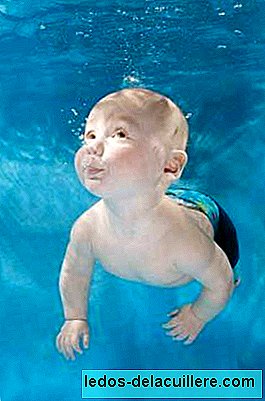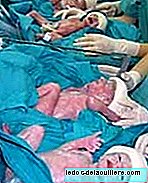Iodine is an essential chemical element for health. The thyroid gland makes the hormones thyroxine and triiodothyronine, which contain iodine. The iodine deficit produces goiter (enlarged thyroid) and myxedema (tissue alteration) and in the event that it occurs iodine deficiency during childhood Cretinism can occur, a deficiency that causes mental and physical retardation.
Iodine is very important in pregnancy and also in childhood, as well as in the lactation stage. That's why we dedicate this article to foods rich in iodine, an essential nutrient, so that our diet and that of our family are not lacking.
According to WHO (World Health Organization), UNICEF (United Nations International Emergency Fund for Children) and CICDDY (International Council for the Control of Iodine Deficiency Disorders), approximately 38% of the world population is exposed to iodine deficiency disorders. Iodized salt is a simple solution to increase the contribution of this nutrient, although many foods are also a good source.
Below we list iodine-rich foods, starting with those that contain a greater amount of this element.

Foods rich in iodine
Iodized salt It is salt that contains added iodine, has been fortified by this addition (common table salt is subjected to processes that reduce its natural iodine content). Common salt or table salt is iodized to cover the nutritional deficiencies of this element in some diets, such as Spanish. Obviously, it is not about eating salt but about using this seasoning in meals (always in a moderate amount, since an excess of salt is also not good). And of course, no added salt in the baby's meals.
Seafood in general (crustaceans and mollusks), which together with iodine has other valuable nutritional properties, are low in fat, contain valuable minerals and vitamins such as vitamin E, folic acid ... Of course, we must bear in mind that it must be well cooked and that in the case of children excessive consumption is not recommended. The Spanish Food Safety Agency (AESAN) calls attention to excess cadmium in crustaceans and recommends that only the white part of these foods be eaten.
Clams and mussels, some mollusks also rich in iron and also have to be well cooked (and take care that they do not carry sand).
Prawns, a very common crustacean on many tables and that must be well cooked, avoiding the heads (non-white parts).
Fresh cod (not salted), a white fish with numerous properties.
Mackerel, a blue fish that also provides omega-3 fatty acids. It is a small fish that does not accumulate heavy metals such as mercury and is therefore recommended even in pregnancy.
Herring, a blue fish on which we can make the same considerations as in the case of mackerel.
White tuna, since red is discouraged in childhood and for pregnant women because of its high mercury content. In contrast, albacore does not present this problem.
Salmon, being a smaller blue fish does not accumulate so many heavy metals and is rich in omega-3.
Fresh sardine, a small blue fish.
Sole, a white fish.
Legumes, a very valuable staple food because together with iodine they are very rich in iron, vitamins, slowly absorbed hydrates, fiber and proteins, copper, calcium, folic acid and do not include saturated fats, which should not be abused.
Broccoli, with multiple beneficial properties and easy to digest, which makes it suitable for the consumption of babies from six months.
Carrot and Spinach, taking into account that they are not recommended before twelve months because of their high nitrate content.
Fresh pineapple, a delicious fruit rich in fiber and vitamins that babies can take from six months if the mother consumes it regularly or from the year of age.
Dairy products derived from animals fed with feed enriched in iodine (it is usual, except for organic products).
As to seaweed, we leave them for the end because, despite their high sodium content, they are not a regular part of our diet and there are some caveats regarding the type of algae. Although algae have been part of the traditional diet in different communities in the East, only in recent years are they being introduced in some places and there are still doubts regarding their properties. Algae are rich in minerals and trace elements that absorb from the sea, calcium, iron and iodine. The European Food Information Council indicates that they can be consumed safely, although care must be taken with some varieties whose levels of salt, iodine or heavy metals can be harmful. For example, the German Federal Institute for Risk Assessment has issued a warning about certain varieties of algae with excessive iodine levels. In addition, brown algae can accumulate heavy metals such as arsenic, which has led the British Food Safety Agency to advise avoiding the consumption of certain species. In general, nutritionists recommend avoiding Hiziki algae (may contain too much arsenium) and Kombu algae (because it may contain too much iodine).
Specific iodine recommendations depend on age, sex and other factors (such as pregnancy). Iodine is a necessary nutrient for the health and development of people at any stage of life, but especially in pregnancy. Pregnant or breastfeeding women need larger amounts of iodine.
According to the World Health Organization (WHO), UNICEF and the International Council for the Control of Iodine Deficit Disorders, the best way to prevent iodine deficiency in the general population is the usual consumption of iodized salt, and for pregnant women, infants and those planning a pregnancy provide an extra supplement of at least 200 mcg of iodine per day as a drug preparation.
Iodine intake from food or supplements is unlikely to exceed the maximum tolerable intake (approximately 1500 micrograms in adults per day; 300 in children four to eight years old).
This list of foods rich in iodine, an essential nutrient For life, it will give us what is necessary to include it properly in our diet, remembering the importance of iodized salt in meals and nutritional supplements during pregnancy.
Photos | iStock
More information | Thyroid
Live on the palate | Types of salt, which one to choose for healthy dishes?
In Babies and more | Iodine deficit affects psychomotor and intellectual development (and in Spain there is a deficit)












